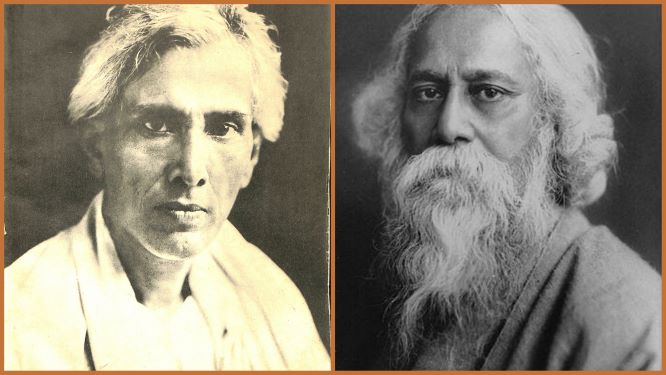
The great revolutionary Sharad Chandra Chattopadhyaya and the British agent Tagore
Many Bengalis, perceiving me as anti-Bengali, made several abusive comments against me on the social media because of my views on the Japanese agent Subhas Chandra Bose and the British agent Tagore. So I am responding
I am not, and I never was anti-Bengali. I am a great admirer of the really great men Bengal produced, and their outstanding contribution to our nation in literature, science, philosophy, social reforms, etc. But I refuse to recognize as great those phony people like Bose and Tagore whom many Bengalis foolishly treat as icons, and idolize.
I am a great admirer of Raja Ram Mohan Roy and Ishwar Chandra Vidyasagar, who led the way to social reforms in India, despite facing tremendous opposition by die hard conservative people who wanted to continue the inhuman practices like suttee and non marriage of widows.
In the field of literature I have the greatest admiration for Sharad Chandra Chattopadhyaya and Kazi Nazrul Islam.
I regard the best poetry in modern India to be Urdu poetry, and the best prose to be Bengali prose. And in prose literature Sharad Chandra towers over everyone in India, like a Mount Everest.
In fact I regard Sharad Chandra as the greatest novelist and story writer India has produced, and indeed one of the greatest in the world.
Sharad Chandra launched a full blooded attack against the oppressive caste system, women’s oppression, and other feudal inhuman customs and practices in India. The first of his works which I read ( half a century ago ) was ‘ Shrikant ‘. his longest novel. After beginning this novel, which some say is autobiographical, I was so mesmerized that I could not leave it until I had read all its 1000 pages. Thereafter I read his Charitraheen, Shesh Prashna, Palli Samaj, Parineeta, Biraj Bahu, Devdas, Grihadah, Vipradas etc. What a fantastic writer, what genuine compassion for the oppressed sections of society. !
In my opinion no writer in the world could equal Sharad Chandra’s women characterization. I have read great literature of the world in which women characters are central to the theme, e.g. Tolstoy’s ‘ Anna Karenina ‘, Gustave Flaubert’s ‘ Madam Bovary ‘, Emily Bronte’s ‘ Wuthering Heights ‘, Margaret Mitchell’s ‘ Gone With The wind ‘ etc but no one could match Sharad Chandra’s women characters, e.g. Rajyalakshmi, Kamal, Kiranmayi, Chandramukhi, Sumitra, Bharati, Savitri, Rama, Bindu, Parvati, Bijaya, Shorasi etc.
Later when Sharad Chandra wrote his ‘ Pather Dabi ‘, the British got scared and they banned it. This novel was about a revolutionary organization wanting to end British rule. After its ban the price of one copy of the novel was said to have become the same as the price of a Mauser pistol.
Since the British rulers of India became scared of Sharad Chandra’s popularity they built up Tagore through Yeats, and their aim was to divert literature from the revolutionary direction Sharad Chandra was taking it towards a harmless channel.
Tagore diverted Bengali literature from the revolutionary direction Sharad Chandra was taking it, and took it towards spiritualism and mysticism, which is nonsense in a poor country like India, e.g. his poems Gitanjali, Klanti, Agnibeena bajao tumi kemon kore, etc. His novel Gora is meaningless. Graham Greene said that apart from Yeats no one takes Tagore seriously, and in fact later even Yeats turned against Tagore, saying that he wrote sentimental rubbish.
Some say that Tagore was patriotic as he refused Knighthood after the Jallianwala massacre. But why did the British offer Knighthood to him at all. Why not to Sharad Chandra, Kazi Nazrul Islam, Subramania Bharati, etc ? Obviously because these persons were not serving British interests.
And as for the Nobel Prize, everybody knows that the Nobel Prize in literature, like the Nobel Prize in peace, is often a joke. Of the 123 Nobel prizes in literature given so far, no one even remembers the names of over 100 of the winners, as they were given to undeserving persons who were serving certain vested interests. Why was the Nobel Prize not given to Sharad Chandra, Kazi Nazrul Islam, Premchand, Subramania Bharati, Faiz, Josh, Manto, Sahir, etc. ?
Some praise Tagore for writing our national anthem, but this is the truth about that song :
http://justicekatju.blogspot.com/…/the-british-stooge…
There are broadly two theories of art and literature (1) art for art’s sake, and (2) art for social purpose
http://justicekatju.blogspot.com/2012/02/role-of-art-literature-and-media.html
Those who belong to the first school believe that art and literature should only aim at producing beautiful and entertaining works, but if it seeks a
social purpose it ceases to be art and becomes propaganda.
On the other hand, the second school believes that art and literature should serve a social purpose, and help the people by attacking oppressive social customs and practices, and inspiring people to struggle for a better life. According to this school, art for art’s sake is only escapism.
https://www.thekashmirmonitor.net/the-true-role-of-art-and-literature/
Tagore belongs to the first school, and Sharad Chandra belongs to the second school. Many oppressive social customs and practices in Bengal were considerably weakened because of Sharad Chandra’s writings.
In his acceptance speech delivered on 15th Sep 1933 at a gathering organized at the Calcutta Town Hall to celebrate his 57th birthday, Sharat Chandra acknowledged his debt to the poor and deprived. He said :
” My literary debt is not limited to my predecessors only. I am forever indebted to the deprived, ordinary people who give this world everything they have and yet receive nothing in return, to the weak and oppressed people whose tears nobody bothers to notice and to the endlessly hassled, distressed (weighed down by life) and helpless people who don’t even have a moment to think that despite some people having everything, they have the right to nothing.
They made me start to speak. They inspired me to take up their case and plead for them. I have witnessed endless injustice to these people, unfair intolerable indiscriminate justice.
It is true that springs do come to this world for some – full of beauty and wealth – with its sweet smelling breeze perfumed with newly bloomed flowers and spiced with cuckoo’s song. But such good things remained well outside the sphere where my sight remained imprisoned. Poverty, oppression, and injustice abound in my writings.”







